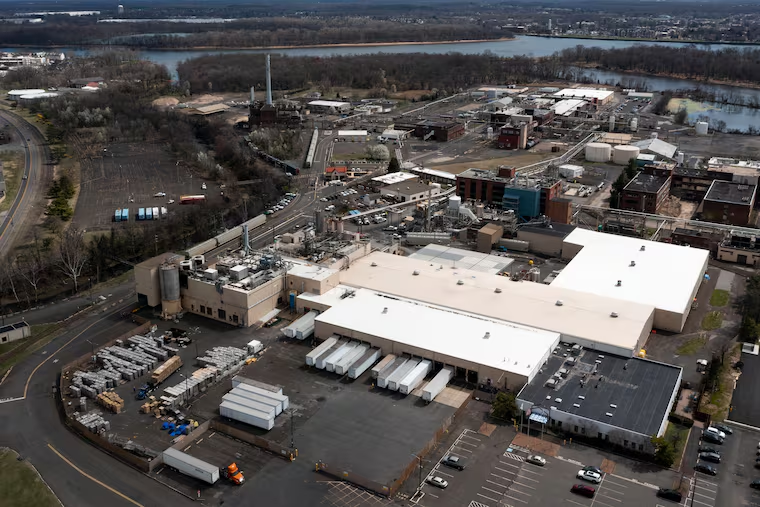Bristol plant that spilled chemicals into Philly’s water supply had other mishaps over the last decade
The plant is among a cluster of industrial companies along the Delaware River that was home to chemical giants since the early 20th century.

A chemical plant in Bristol that authorities said caused a toxic spill, threatening Philadelphia’s drinking water, has a long history of mishaps — including at least four recent contamination incidents.
The complex is owned by chemical company Trinseo, which produces acrylic products such as Altuglas, which is similar to Plexiglas. But the site is part of a cluster of industrial companies along the Delaware River north of Philadelphia that has hosted chemical giants since the early 20th Century.
Friday night’s spill, officials said, contained methyl methacrylate, butyl acrylate and ethyl acrylate, which are commonly used to produce glass-like acrylics, but are also all regarded as hazardous to humans. Butyl acrylate was among the hazardous materials detected at the recent East Palestine, Ohio, train derailment site.
Many incidents, similar chemicals
Throughout its history the site has been subject to frequent monitoring by government regulators. Over the past decade, the U.S. Coast Guard twice before detected releases of acrylates from the Bristol facility into the Delaware. The EPA had separately flagged two other acrylate releases.
David Salas-de la Cruz, a Rutgers University associate professor of chemistry, worked at the Bristol plant during its Rohm and Haas days. He said the number of incidents over the past decade was unusual.
“That’s a lot. That’s not normal,” he said. “That’s too many incidents involving similar chemicals.”
» READ MORE: Philly water is safe to drink until at least Tuesday afternoon after chemical spill, officials say
In 2010, the U.S. Environmental Protection Agency investigated what the agency described as the Arkema plant’s “release” of 1,760 pounds of methyl methacrylate during transfer to a storage tank. An EPA report states the incident later led to “the excavation and disposal of the contaminated soil.”
The EPA documented another release, this time of butyl acrylate and ethyl acrylate, that required remediation between 2012 and 2013. Then, in 2014, records from the United States Coast Guard National Response Center show that the plant spilled 300 gallons of ethyl acrylate, triggering a facility evacuation and a shelter-in-place order for a local school. Soil and asphalt contaminated by the chemicals were later removed from the site.
In 2020, the EPA issued a corrective action plan for a 60-acre area encompassing the former Rohm and Haas facility as well as some surrounding land that had been used for chemical or wastewater processing for over a century. The agency found that the groundwater throughout the area was “contaminated with a variety of organic and inorganic chemicals.”
In early 2021, the Coast Guard identified an Arkema pipeline at the facility as the source of another leak involving an unknown quantity of methyl methacrylate.
Janet Smith, a spokesperson for Arkema, said she had “no recollection” of chemical mishaps at the plant, but that “all of the employees and records went to Trinseo. We’re not able to say a whole lot of that because we expunged all that.”
EPA records do not list any violations from the acrylics section of the facility since Trinseo acquired the Bristol plant in 2021.
Until the 1990s, the sprawling chemical plant was operated by Philadelphia chemical giant Rohm and Haas. The company had operated in that location since at least 1917, when it cleared much of the nearby community of Maple Beach, Pa., to expand operations. It began producing the acrylic glass product marketed as Plexiglas at the site as far back as the 1940s.
Rohm & Haas later partnered with the French chemical concern Elf Atochem S.A. to continue manufacturing Plexiglas in 1992. In 1998, Elf Atochem became the sole owner of this acrylics business, but soon spun off the division into a new company, called Arkema, in 2004.
Quickly reopened
Arkema operated the Bristol plant for much of the past two decades.
Separately, Dow Chemical spun off several of its own subsidiaries in 2009, which were purchased by Bain Capital and rebranded as Trinseo in 2012 (Bain later divested from the new firm).
In 2021, Trinseo, which is headquartered in Wayne, Pa., acquired Arkema’s acrylics division, and has continued producing acrylic and resin products like Altuglas at the Bristol site, for use in automotive, construction, medical products and other consumer goods.
Salas-de la Cruz, the Rutgers professor, said he was also surprised the plant had reopened so soon after the recent spill.
“When I was at Rohm & Haas, safety was their first priority,” he said. “But they’ve already opened again. The question is, did they fix the problem? And was this burst related to the prior incidents?”
Trinseo officials did not respond to multiple requests for comment.
The roughly $3 billion company saw its stock price drop around 5% on Monday amid news that it had briefly idled the acrylics plant after the spill.
Staff writer Frank Kummer contributed to this article.
An earlier version of this article listed an incorrect date for Dow’s acquisition of Rohm & Haas.